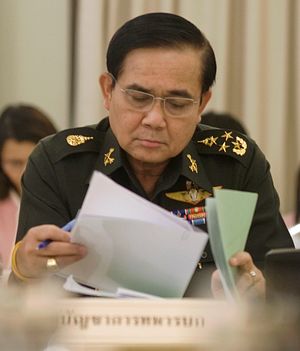The pot calling the kettle black is the newest normal in the government of the self-appointed Thai Prime Minister Prayuth Chan-ocha. Claiming to eradicate rampant corruption allegedly cultivated by the supposedly evil Thaksin regime, Prayuth took political power with an adamant mission to cleanse Thai politics. Obviously, blaming Thaksin Shinawatra, Thai premier from 2001-2006, and the recently deposed government of Yingluck Shinawatra, Thaksin’s sister, was a winning tactic to legitimize the coup of May 22.
But as it has turned out, Prayuth’s handpicked Cabinet members are not any more ethical than the supposedly corrupt Shinawatras. Last month, Minister of the Prime Ministerial Office, M.L. Panadda Diskul, an anti-Thaksin and royalist figure, was implicated in a series of corruption allegations. In refurbishing the meeting room at the Government House, he allegedly purchased state-of-the art microphones and electronic curtains at much higher prices than they are normally on sale for on the Internet.
Scrutinized by the public, Panadda, who earlier condemned the Thaksin regime and its infectious corrupt practices, immediately evaded the allegations and disappeared from the public eye. Prayuth solved the issues by returning the expensive microphones and curtains to the company without any serious probes into the murky purchases.
But the latest corruption allegations could seriously pose a challenge to Prayuth’s regime. As part of the terms of being appointed the National Legislative Council (NLC), members are required to reveal their assets and properties to determine if they are “unusually rich.” In the beginning, a number of NLC members were reluctant to disclose their wealth status. For example, Pornpetch Wichitcholchai, president of the NLC, refused to do so, claiming that some of his belongings were “priceless” and therefore their value could not be estimated.
But the eventual revelation of the NLC members’ assets shocked many Thais. Police Chief Somyos Poompanmuang and his wife’s net worth was revealed to about 355.8 million baht (roughly $11 million), raising questions about how a lifelong career in the public service could have made him a millionaire many times over.
Another shocking case has been that of Prayuth’s own brother, General Preecha Chan-ocha, who was also handpicked to serve in the NLC. Preecha earlier declared that he possessed assets worth approximately 79 million baht. This prompted social media users in Thailand to try and trace the sources of Preecha’s wealth. These investigations found that the money in at least one of Preecha’s bank accounts had apparently come directly from the budget of the 3rd Army, which he used to command. They also found that due to a “math” error in adding up his bank accounts, Preecha’s net worth was closer to 90 million baht than the 79 million baht he originally claimed.
But Thais are not hopeful that Prayuth will censor his brother for these transgressions. Preecha Chan-ocha’s case will in all likelihood prove similar to earlier ones that the press stopped covering and the people soon forgot.
A few days ago, Prayuth appeared angry when Thais demanded the government increase transparency. He reportedly said, “I beg you not to dig up anything. There is no benefit in so doing. My government is here today to solve problems. I have so many burdens on my shoulder. My wife is also in this difficult situation. I just want some kind of moral support from you. I need your understanding. But the media has tried to dig up many issues. So have some politicians. I must say that you cannot do that for the time being.”
Ironically, the government, which had set out to be a model of good governance, has continued to sink in controversies. The supposed need for the coup was to eradicate chronic corruption, but it is now apparent that the Prayuth government has instead further exacerbated the corruption culture. Worse, out of fear for their own safety, neither the media nor the public are willing to speak out on many of the unattractive realities of Prayuth’s regime. At the end of the day, Thailand is still under a martial law and the National Council of Peace and Order—the governing body of the coup makers—has established itself as the sole sovereign of the Thai nation.
The filthy politics à la Prayuth is also indicative of an anxiety hidden in the mind of the army and its supporters in the palace. Undoubtedly, the 22 May coup was not meant to tackle the so-called corruption problem, since the coup makers themselves are not free from corrupt practices. But the coup was staged in order to ensure that representatives of the palace would be able to take control of politics at the critical royal transition. The stakes are too high to allow Thaksin proxies to be in charge at this point in time. Thus, they had to be eliminated. Corruption just happened to be the perfect excuse to legitimize the decision to topple the Thaksin-backed regime.
But the case of Prayuth’s brother exposed the fact that military and political officials are equally sullied in corruption in Thailand. The only difference is that under military rule, requests for transparency and good governance often fall on deft ears.
Pavin Chachavalpongpun is associate professor at Kyoto University’s Center for Southeast Asian Studies.

































